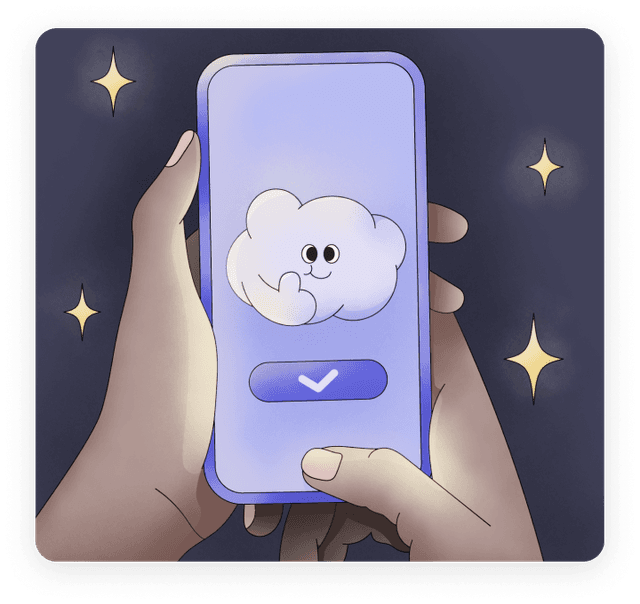
Denys Chumak
04 Apr 2024
Is Dreaming A Sign Of Good Sleep?
The purpose of dreams is still a highly debatable topic in the scientific community today. Researchers and sleep specialists agree on very few key ideas. One such idea is when dreams happen during our regular sleeping cycle.
When you sleep, your brain goes through two main stages: NREM (Non-Rapid Eye Movement) and REM (Rapid Eye Movement). Dreams can occur during both of these stages, but they're more likely to happen during REM sleep, which is the final stage.
So, if you remember having dreams, it's a sign that your brain has been going through this last stage of sleep, which is a good indicator of a healthy sleep cycle.
Now, here's the big question: what comes first? Does dreaming make you have a good sleep cycle, or does a good sleep cycle make you dream? Which comes first?
What is A Good Sleep Cycle? – And When Do We Dream
Scientists have known for a long time that poor sleeping habits and irregular sleeping patterns reduce human longevity. Sleep deprivation is tied to some of the most dangerous diseases including a higher risk of obesity and heart disease.
Surprisingly, none of these negative outcomes have anything to do with dreams. No matter how good or bad your dreams may be, it appears that they do not negatively impact your mental, emotional, or physical health.
Let’s look at when dreams happen in the sleep cycle to get a clearer picture of why that is:
- NREM Stage 1
It is the first stage making up about 5% of the sleep cycle. Your mind is mostly awake but you are drifting off. Dreams that happen during this stage are short and often incorporate noises from your surroundings or events from that day. You are less likely to remember these dreams
- NREM Stage 2
You are less likely to remember dreams in this stage too. Stage 2 accounts for about 45% of the sleep cycle and at this point you have become less aware of the surrounding. Some scientists believe this is where memory and emotion processing/consolidation happens through dreams and thoughts.
- NREM Stage 3
About 25% of sleep takes place here. This is where many people sleepwalk because it’s harder to wake up at this stage. The body repairs itself physically and the immune system is boosted, making sure you are energetic and refreshed in the morning.
More memories are processed here and anything learned during the day is consolidated. Your brain repeats NREM Stage 2 before going to REM sleep.
- Stage 4 - REM Sleep
Usually begins about 90 minutes after NREM Stage 1. Your body is fully immobilized but brain activity increases causing rapid eye movement, increased heart rate, and breathing.
Due to increased brain activity, dreams are frequent here and more vivid, making it the epicenter of dreaming. Your body is immobilized which ensures you cannot act out your dreams.
The brain activity is similar to that of wakefulness but without the same level of consciousness. This allows the mind to generate thoughts, and plans, and imagine fictitious scenarios without consequence. Once the stage is over, your body repeats NREM Stage 2, and the cycle starts all over again.
Note that these stages occur more than once during the night, but always in the same order. In total, you dream for about 2 hours every night when you get a full 8 hours of sleep or more.
But you may be wondering, “I don’t dream every day!”
In reality, every person dreams each time they are asleep, we just don’t remember the dreams each time.
Remembering Dreams Leads to Good Sleep

According to Deirdre Barrett, a dream researcher at Harvard Medical School, we forget so many of our dreams because during REM sleep the brain’s short-term memory is most active, but it only holds memories for about 30 seconds.
Once you drift back into NREM Stage 2 without waking up, the brain forgets that dream since it never enters long-term memory.
After sleeping for about 8 hours, the REM stage will occur during those final hours. If you wake up after the 8 hours then your awake brain will have time to store the short-term memory into the long-term memory before the short 30-second window elapses.
This makes your waking routine extremely important if you want to remember your dreams more often. A good practice is to have a dream journal close to your bed. You may also go for a softer alarm system to avoid a loud awakening that may distract you as you wake up.
Does Remembering Your Dreams Mean You Slept Well?
If you keep remembering your dreams day in and day out, then you are constantly getting good sleep which translates to a healthy mind and a healthy body.
However, there is an exception – recurrent nightmares.
Occasional nightmares are normal. Some research shows that nightmares are a beneficial evolutionary trait, a mechanism that simulates rehearsals of threat perception and avoidance thereby preparing us for danger.
The problem arises when nightmares continue to occur on a regular basis. This causes you to drift in and out of REM sleep which is one of the most restorative stages. When interrupted, it takes longer for your mind to relax and get back to REM sleep, eventually, your sleep duration and quality are affected.
Recurrent nightmares can be caused by stress, major life-altering events such as the loss of a loved one, increased stress, too much alcohol/drug use, alcohol/drug withdrawals, illness, over-the-counter (OTC) sleeping pills, abrupt stoppage of OTC sleeping pills, PTSD, depression, or anxiety disorders.
Ensure you consult a medical professional to help address the nightmares further.

What Is Good Quality Sleep?
As seen, dreams (apart from recurrent nightmares) are signs of a healthy sleeping cycle. However, they are not the best signs.
The best sign of quality sleep is waking up feeling energetic, well-rested, refreshed, and not in need of any external stimulation like coffee. This is a better indicator of good sleep that does not rely on dreams that you may or may not remember.
Other good signs include:
- Getting a full 8 hours of sleep or more which maximizes time spent on REM sleep.
- Uninterrupted sleep.
- Going to bed at the same time every night.
- Using sleep tracker apps like SleepScore or SleepPilot to improve sleep through data-driven insights.
- Maintaining good sleeping hygiene techniques like reducing caffeine and increasing daily exercise.
Conclusion
In conclusion, unless you are experiencing recurrent nightmares, dreaming won’t negatively affect your sleep, it improves it.
Dreaming has more benefits like improved creativity and memory. Moreover, there are specialists who can help you interpret your dreams to unlock their meaning and offer interpretations that may provide eye-opening insights.
Frequently Asked Questions (FAQs)
-
Does Dreaming A Lot Mean Good Sleep?
So long as you are getting enough sleep and the dreams aren't recurring nightmares, then you can rest assured that your many dreams are a sign of good sleep. They are a symptom of ample rest, a relaxed, mind, effective memory consolidation, and emotional processing.
It is also normal to dream a lot. Human beings dream every day but we do not always remember our dreams. If you are remembering your dreams often, then it means you are experiencing increased awareness which also increases creativity in the waking life.
-
How To Monitor Your Sleep Quality?
Several studies have proven that monitoring your sleep quality is the best way to recognize patterns in your sleep habits. Using tracking devices, such as wearables and smartphone applications, can help patients understand why they feel sluggish sometimes and energetic at other times, depending on when and how long they slept.
The optimized sleep monitors analyze data recorded during sleep. The data is then used to provide useful information like sleep cycles and body movement behaviors, and in so doing, helps you improve the quality of your sleep.
The insightful data is presented in user-friendly ways including graphs and reports that will help you make sense of the quality of your sleep. Suggestions and recommendations are also made using personalized reports that help improve your sleeping habits.
Did you have an unusual dream with this symbol?
Let's analyze this dream with our expert!
At least five words, please.

Your dreams are completely private
Take control of your dream emotions in the free mobile app



The most recent users' dreams
Go to the user dreams page
Dream App
Free dream interpretations

(1,213)











